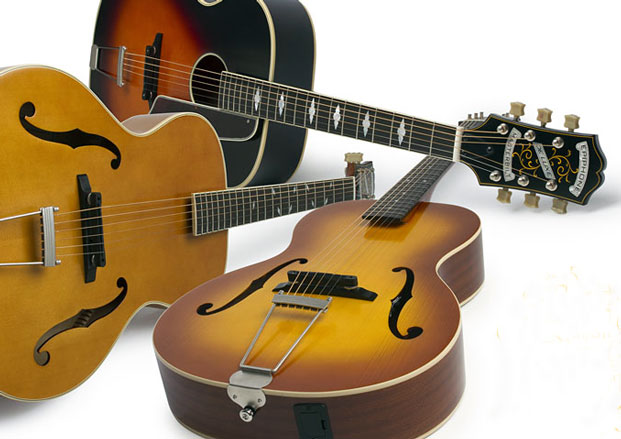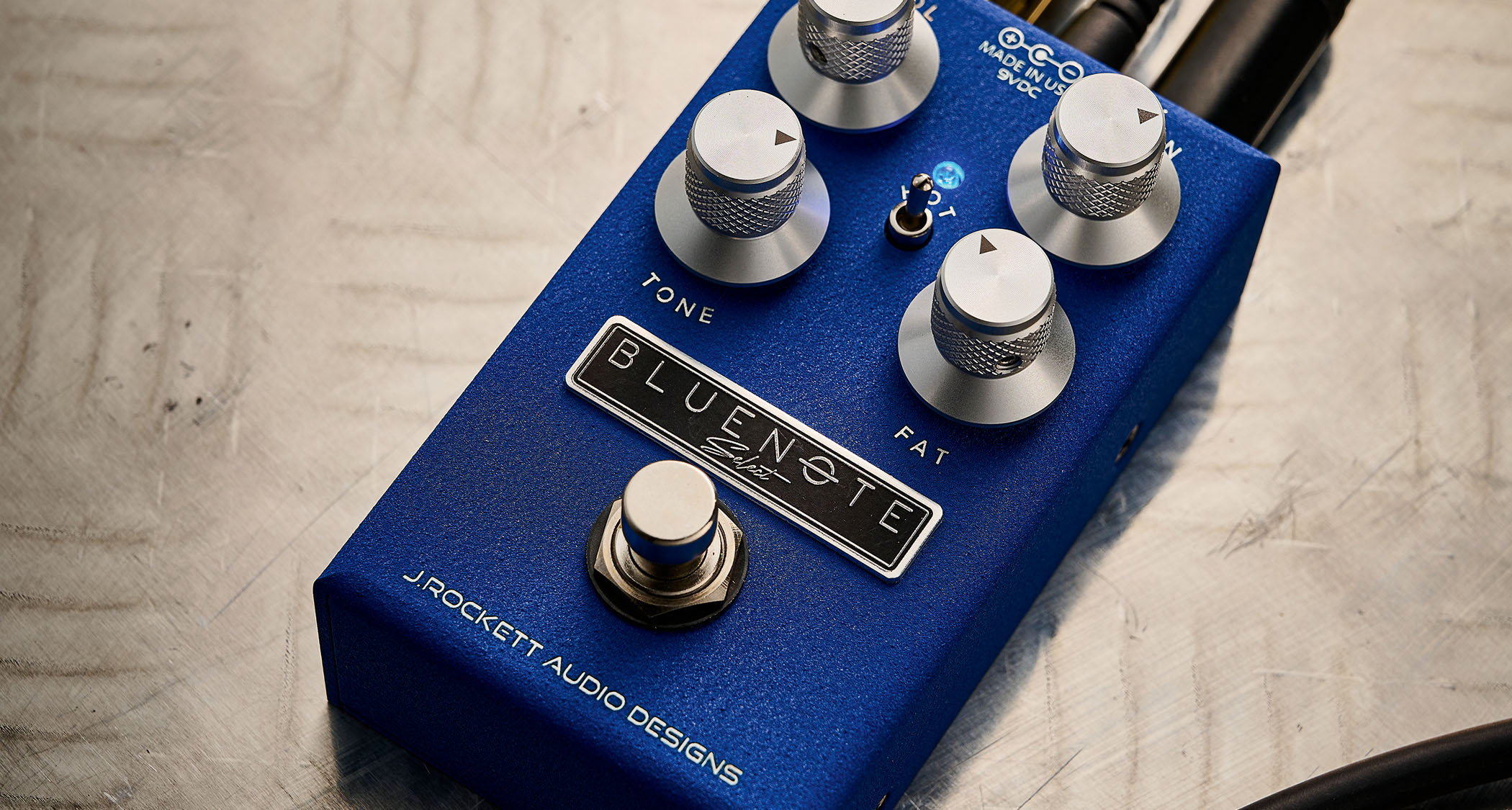Review: Epiphone Masterbilt Century Collection Guitars

The archtop acoustic, particularly the “modern” version of the instrument featuring f-holes, enjoyed only a brief period in the limelight as the instrument of choice for performing guitarists, particularly those who played in big bands.
Its days of dominance were numbered once the electric guitar came along in the mid Thirties, and after World War II it virtually became extinct. From the Sixties until recently, the archtop acoustic has mainly been an expensive curiosity, built for either wealthy pros or collectors in extremely limited numbers by a handful of major manufacturer custom shops and exclusive boutique luthiers.
Epiphone’s new Masterbilt Century Collection boldly reintroduces the archtop acoustic as a working musician’s instrument for the new millennium. These new affordably priced models are actually acoustic-electric instruments that sound equally great whether played unplugged or amplified.
Epiphone offers three different Masterbilt Century archtop models—the Olympic, Zenith, and De Luxe—and the Zenith and De Luxe models are available in a choice of either f-hole or round hole versions, while the Olympic is only available with f-holes. We took a look at Epiphone’s two largest models, the 16-inch Zenith with f-holes and the 17-inch De Luxe with a round soundhole.
FEATURES
Visually the Zenith and De Luxe are stunning, boasting several design elements inspired by Epiphone’s original Masterbilt series guitars from the early Thirties, including the banner inlays on the headstock overlays and the De Luxe’s notched diamond fingerboard inlays. While all three models have the same names as Epiphone Masterbilt models from the Thirties, the new Masterbilt models have entirely new designs and refinements, and all but the staunchest purists will find the new models improvements over their original pre-1934 namesakes. Besides having a body that is about one inch bigger all around (lower bout, upper bout, waist, and length), the De Luxe features a floating pickguard. The Zenith has no pickguard, and it features “falling snowflake” fretboard inlays instead of notched diamond inlays.
The Zenith and De Luxe both feature an arched solid spruce top with longitudinal bracing, laminated flame maple back and sides, and a five-piece laminated hard rock maple and mahogany neck with a rounded C-shaped profile, ebony fretboard, 20 medium frets, and 25 1/2–inch scale length. Hardware includes Historic Epiphone reissue “E-stamp” 18:1 tuners with marboloid “crown” buttons (cosmetically based on the tuners found on high-end Epiphones starting in 1939), a nickel-plated Historic Epiphone trapeze tailpiece, and a floating adjustable Ebonoid bridge that is more robust than ebony.
Get The Pick Newsletter
All the latest guitar news, interviews, lessons, reviews, deals and more, direct to your inbox!
A Shadow NanoFlex HD pickup is mounted under the saddle, which is connected to an eSonic HD preamp system. On the roundhole De Luxe, the master volume and master EQ controls are mounted just inside the soundhole, while on the f-hole Zenith the volume and EQ controls are mounted inside the lower (treble bout) f-hole. The easy access compartment for the 9-volt battery that powers the preamp and the 1/4-inch output jack are located just below the endpin.
PERFORMANCE
One of the coolest features of a good archtop acoustic guitar is the fast, percussive attack (often described as “cut”) it delivers when strumming chords. Our Zenith model with its f-hole design provided classic archtop tone that reminded me of several outstanding vintage and boutique archtop acoustics I’ve played that sell for thousands of dollars. While the attack is very aggressive and punchy, the sustain is also impressive, although the resonance is not quite as rich and reverberant as a flat top acoustic. The overall frequency response is also a bit tighter, with fat but focused bass and brilliant but not shrill treble.
If you prefer a bigger, more resonant tone, the round hole version of the Zenith or De Luxe may be a better choice. Our De Luxe had the added advantage of having a bigger body than the Zenith, but the increased resonance likely was influenced more by its round hole design than its bigger size. The De Luxe is an impressive powerhouse either way, with aggressive volume projection and a slightly wider frequency range with bigger bass and more complex treble.
The electronics amplify the natural acoustic tone and character of both models in accurate perfection. The master EQ provides the right amount of bass boost or treble emphasis, and the system can handle impressively loud output levels without feeding back.
STREET PRICES Masterbilt Century Zenith Classic, $739; Masterbilt Century De Luxe, $899
MANUFACTURER Epiphone, epiphone.com
• The Zenith and De Luxe models are available with either a traditional f-hole design or a round soundhole that delivers bigger, more resonant tone.
• The Zenith has a 16-inch body and “falling snowflake” fretboard inlays, while the De Luxe has a 17-inch body and “notched diamond” fretboard inlays.
• Both models have a solid spruce arched top with longitudinal bracing to produce fast, percussive attack and outstanding volume projection.
• The Shadow NanoFlex HD under-saddle pickup and eSonic HD preamp system amplify the guitar’s archtop tone with all of its natural warmth and body.
THE BOTTOM LINE
The Epiphone Masterbilt Century Collection guitars are the perfect affordable choice for any guitarist interested in exploring the signature sound of an archtop acoustic guitar or anyone who wants a finely crafted, visually stunning acoustic guitar for recording and performing.
Chris is the co-author of Eruption - Conversations with Eddie Van Halen. He is a 40-year music industry veteran who started at Boardwalk Entertainment (Joan Jett, Night Ranger) and Roland US before becoming a guitar journalist in 1991. He has interviewed more than 600 artists, written more than 1,400 product reviews and contributed to Jeff Beck’s Beck 01: Hot Rods and Rock & Roll and Eric Clapton’s Six String Stories.
The heaviest acoustic guitar ever made? Two budding builders craft an acoustic entirely from concrete because they “thought the idea was really funny”
“For years, the only 12-string acoustics I got my hands on, the necks always pulled off after a bit. I earned a lot of money replacing them!” Why one of the UK’s most prolific luthiers is a bolt-on acoustic die-hard











